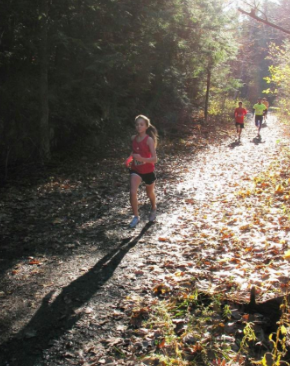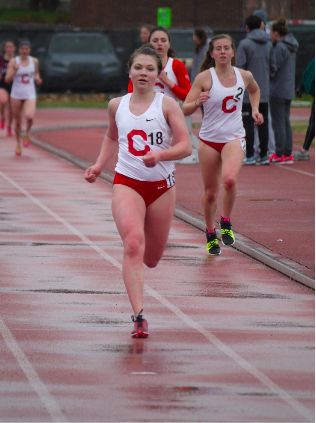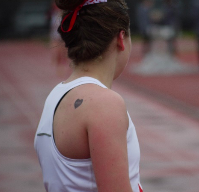by Kirstin Sandreuter
June is quite often a month of transition, something I am feeling in full force as I graduate college. As I turn a new page, I’ve been reflecting on the past four years and asking things like:
What did I accomplish?
Did I achieve my goals?
Am I better now than I was before?

Answering these questions has been hard. I started college with big dreams and high hopes. After a successful high school running stint, I’d been recruited by a D1 team and was ready to shine. I was prepared to work hard, push myself, and explore my potential, which I felt was yet untapped. Though I knew they were lofty, my goals included setting school records, earning All-American honors, and setting myself up for a post-collegiate running career.
If I were to consider my reflection questions with those goals in mind, the answer to every single one would be a resounding “no.”
In fact, with those outcomes as my yardstick, I completely failed at being the runner I set out to be. In my four years on a D1 team, I competed in just 5 races, all of them slower than I ran for those same distances in high school. I dealt with 6 stress fractures and spent more time on the stationary bike than on the track or trails. As all this was unfolding, I spent a lot of time discouraged and believing that I had failed. Although I knew I hadn’t given up on my dreams, it seemed I was taking several steps back on the road to the outcomes I wanted.
But thinking back on college, I know I worked hard. I am certain I overcame barriers, challenged myself, achieved things that once seemed impossible, and became a much stronger, more resilient person. As I’ve realized these things, a new question has entered my mind… aren’t those the same goals I was chasing through running? When I answer honestly, I know they absolutely are – my desire to get faster and compete at higher levels stemmed from wanting to become a better person. What’s hard is that the way I’ve achieved these same things on the sidelines hasn’t come with all the glitz and glamour that success on the track would have.
My hard work in college was eating disorder recovery.
Much of my time these past four years was devoted to working with my family, coach, doctors, dietitians and therapists to address the biggest factor impeding my lifelong goals – the female athlete triad.

Before college, I assumed nothing could be more grueling than a hard track workout. At the time, I had no idea what a long and tough road it could be to recover from an eating disorder, improve bone density and gain a natural period while watching friends succeed in the sport you so badly want to succeed in as well. But just as focusing on the positive, embracing temporary discomfort and forging ahead are essential to completing a hard workout, they are also key ingredients to healing. And the outcome can be just as sweet, if you allow it to be.
The lesson I’ve learned is that success comes in many different forms. Some forms of success just happen to attract more praise and recognition than others.
When you eat a cookie and thoroughly enjoy it, no one is likely to give you a medal, interview you, or ask you for inspiring advice on how they can follow your example. Same goes for when your period comes back or when you run consistently for 3 months without getting a stress fracture. In any of those situations, you’ll be hard-pressed to find the same external reinforcement that comes with a PR on the track. But I would argue that you’ve worked just as hard in different ways, and overcome important barriers that deserve to be celebrated.
We’ve all heard the common sports slogan, “no guts, no glory.” But what about those who have all the guts, and get none of the glory? Fast, elite performances are undoubtedly amazing, but they are far from the only feats that we should celebrate. Every time you make a hard choice that’s right for you, challenge yourself to improve, or take a small step in the direction of your goal, you have succeeded.
Eating disorder recovery is not simply a stepping stone to reach an eventual “better” achievement or a make a huge athletic comeback… it is a victory in and of itself.
My favorite quote, by Joan Benoit Samuelson, drives home the lesson I have learned. She says, “Love yourself, for who and what you are. Protect your dream, and develop your talent to the fullest extent.” It’s so important to love ourselves for who we are, not what we do. This does not mean we shouldn’t dream big , we should, but we need to understand that it is not recognition or accomplishments that make us worthy of love.
What truly matters is our inner drive to know and protect our hearts, resiliently to seek our most full, purposeful life, and putting our talents to good use. This will look different for each one of us, which is why success in the world’s eyes is often far too narrow.
 You are unique, and your hard work is meaningful. So, whatever your success may be, whether or not it looks like you once thought it would, celebrate it joyfully! I am smiling right along with you.
You are unique, and your hard work is meaningful. So, whatever your success may be, whether or not it looks like you once thought it would, celebrate it joyfully! I am smiling right along with you.
Kirstin is a recent college graduate excited to embark on the next steps of her journey. She is passionate about the joy and strength she draws from her faith, her community, and from running free of disordered eating. Sharing this passion with others fills her heart up. She can be reached at: kjs276@cornell.edu.
National Eating Disorder Association Helpline: 800–931–2236
Submit your essay to Lane9Project@gmail.com.
Join our newsletter. Follow on social: @Lane9Project
Let's Go!
Coaching for Runners
Work with our coaches for a personalized training plan that takes into account every aspect of your life - from season to traveling to terrain.
Learn More
Workshops for Teams
Book a workshop to help shift team cultures and coach attitudes to provide a healthier environment and more competitive athletes.